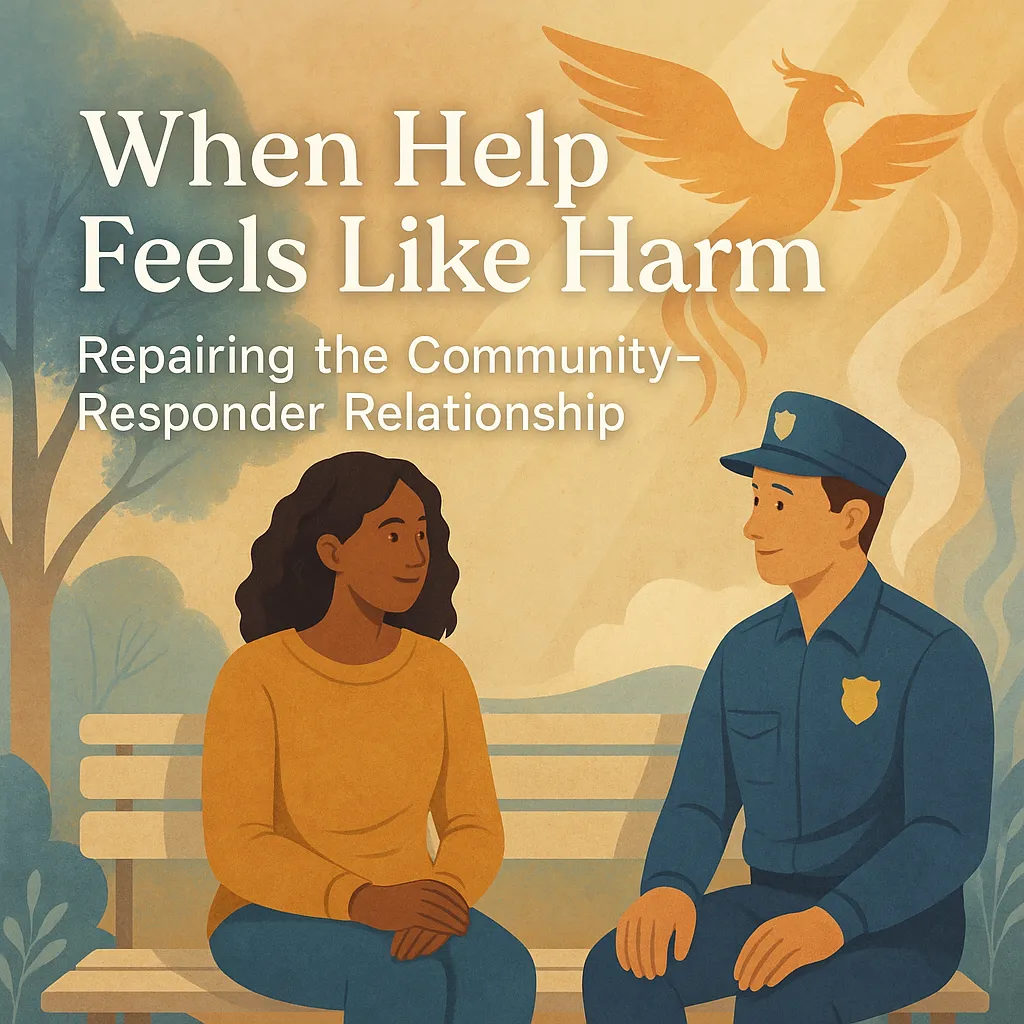
RISEUP Community: When Help Feels Like Hurt
When Help Feels Like Harm: Repairing the Community-Responder Relationship Through Trauma-Informed Care
By Krista Fee | RISEUP: Voices From the Frontlines | Community Safety Series
There’s a difficult truth we need to face head-on: help doesn’t always feel helpful. And for many communities—especially those shaped by systemic stress and historical trauma—the presence of responders can trigger fear rather than relief.
In this episode of RISEUP: Voices From the Frontlines, we unpack the trauma gap between the public and the people sworn to protect and serve. We explore why this disconnect exists, how it’s reinforced, and what we can do to rebuild trust without erasing truth.
This is not about blame. It’s about biology, history, and the human need to feel safe.
Why the Sight of a Uniform Can Feel Like a Threat
For some communities, especially those impacted by racism, poverty, or historical injustice, the appearance of a uniform doesn’t register as protection—it signals danger. Even well-intentioned responders may be met with mistrust, defiance, or fear.
This isn’t paranoia. It’s trauma memory.
Trauma imprints not only from direct experiences but also from generational patterns and collective history. When people have been profiled, ignored, dismissed, or harmed—over and over—it leaves a neurological footprint.
This is called neuroception, the brain’s unconscious ability to detect threat. And trauma disrupts it. The body learns to anticipate harm, even in the absence of present danger. That means people may react as if they’re under attack—even during an attempt to help.
How Responders Experience the Backlash
This mismatch creates enormous tension for first responders. They’re showing up to serve—but are met with suspicion, resistance, or rage. Many responders carry their own trauma, including moral injury and compassion fatigue, while operating in high-pressure systems that rarely offer adequate support.
When help feels like harm on both sides, we don’t have safety—we have escalation.
The solution isn’t better PR. It’s better presence—informed by trauma science, community wisdom, and relationship-first approaches.
5 Trauma-Informed Practices to Rebuild Community Trust
Here are five actionable strategies to begin closing the gap between responders and the communities they serve:
1. Show Up Outside the Crisis
Trust isn’t built at a crime scene. It’s built at basketball games, art programs, and school events—when nothing is on fire and no one’s being arrested.
Example: A fire captain volunteers weekly at a local youth center. Over time, he went from being “the scary guy” to “Coach Chris.” That slow presence built safety cues into the nervous system.
2. Acknowledge Harm—Even If You Didn’t Cause It
You don’t need to apologize for all of history to recognize its impact.
Say this:
“I know this uniform hasn’t always meant safety. I’m not here to ignore that—I’m here to do better.”
Acknowledgment activates the part of the brain that regulates pain. It lets people know they’re not crazy for feeling unsafe—and that changes everything.
3. Regulate Before You Respond
The tone, posture, and energy responders bring into a situation can escalate or de-escalate in seconds. Self-awareness is tactical.
Example: A responder lowers their voice and takes a physical step back before speaking. “I’m here to help. I don’t want to add stress—can we talk?” That one shift can prevent confrontation.
4. Ask Before You Act
Simple questions preserve dignity and autonomy—two things trauma strips away.
Try this:
“Would it help if I explained what I’m doing?” or “Do you want me to stay close or give you space?” These micro-choices send a message: You matter. I respect you.
5. Create Shared Language
When safety plans, flyers, or protocols are designed with the community, not just delivered to them, people engage more deeply.
Example: Responders worked with faith leaders and youth mentors to co-create a disaster plan in their neighborhood. Because the language felt familiar, people actually read it—and used it.
Crisis Pods: Where Response Meets Relationship
At RISEUP Phoenix, our Crisis Pods are mobile trauma-informed units that don’t just deliver supplies—they build connection.
Each pod includes:
Medical and nutritional essentials
Emotional first aid kits for families
Trauma-informed tools for responders
Outreach materials for pre-crisis education
We send pods before disaster hits—because trust needs to arrive before the sirens.
🌍 SUPPORT THE MISSION
We’re raising $50,000 to deploy our next Crisis Pods in Texas and Chicago, areas experiencing high levels of community trauma, natural disaster impact, and frontline stress.
💥 Your donation provides direct support to families, educators, responders, and underserved communities.
🔗 Donate now → https://battle2be.org
🤝 SPONSOR WITH PURPOSE
Are you a brand or organization committed to community healing, public safety, or trauma-informed care?
We’re inviting values-aligned sponsors to support RISEUP: Voices From the Frontlines. Sponsorship fuels:
Crisis response and outreach
Culturally competent education for responders
Mobile resource delivery in under-resourced areas
📩 Request a sponsorship packet → battle2be.org
🎧 JOIN THE CONVERSATION
Healing doesn’t happen in silence. It happens in relationship.
If you’re ready to be part of the solution—whether as a responder, advocate, or community member—listen to the full episode of When Help Feels Like Harm, and share it with someone who needs to hear this message.
🎧 Listen now → https://feeds.megaphone.fm/HERML4183537849
🏷 Tag and share: #RISEUPVoices #CommunitySafety #TraumaInformedCare #CrisisPods #TrustRepair #FirstResponderHealing #WhenHelpFeelsLikeHarm
